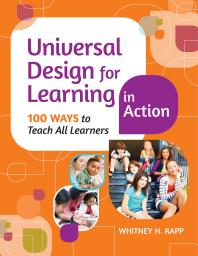
 Pedagogy and Student Services for Institutional Transformation: Implementing Universal Design in Higher Education
by
Jeanne L. Higbee and Emily Goff, editors
Pedagogy and Student Services for Institutional Transformation: Implementing Universal Design in Higher Education
by
Jeanne L. Higbee and Emily Goff, editors
 Universal design for learning in action : 100 ways to teach all learners
Universal design for learning in action : 100 ways to teach all learners
 Teaching Every Student in the Digital Age
by
Rose, Meyer, & Strangman
Teaching Every Student in the Digital Age
by
Rose, Meyer, & Strangman
 Teaching in Today's Inclusive Classrooms: A Universal Design for Learning Approach
by
Gargiulo & Metcalf
Teaching in Today's Inclusive Classrooms: A Universal Design for Learning Approach
by
Gargiulo & Metcalf
 The Universally Designed Classroom: Accessible Curriculum And Digital Technologies
by
Rose, Meyer, & Hitchcock
The Universally Designed Classroom: Accessible Curriculum And Digital Technologies
by
Rose, Meyer, & Hitchcock
 Universal Design for Learning
by
Council for Exceptional Children
Universal Design for Learning
by
Council for Exceptional Children
 Universal Design for Learning in Higher Education: From Principles to Practice
by
Burgstahler & Cory
Universal Design for Learning in Higher Education: From Principles to Practice
by
Burgstahler & Cory